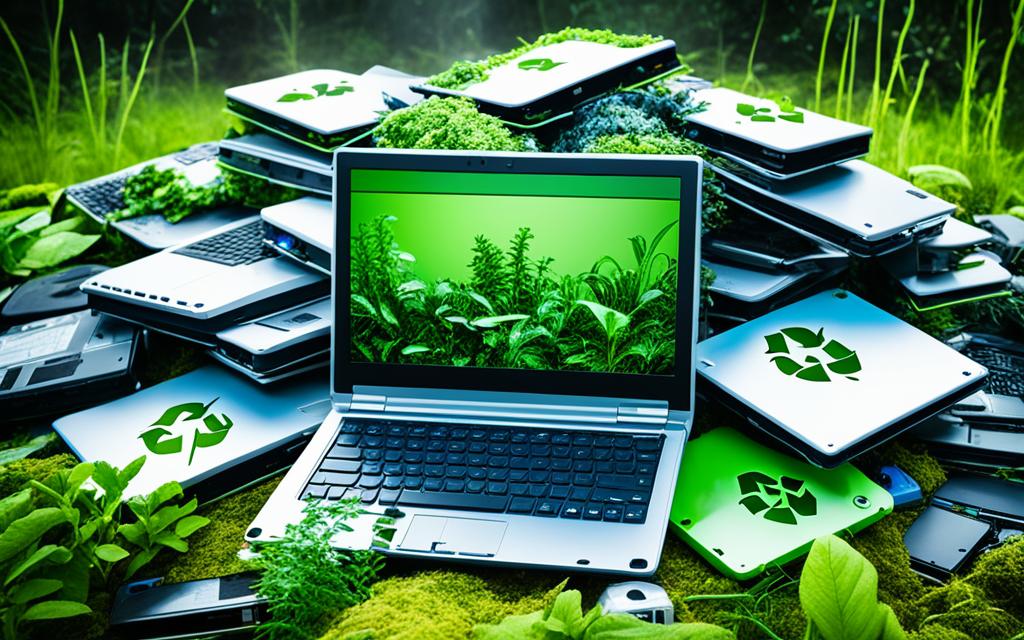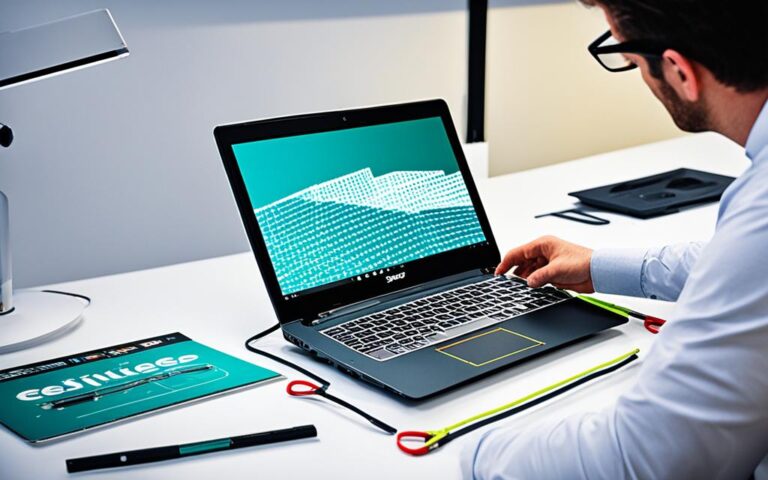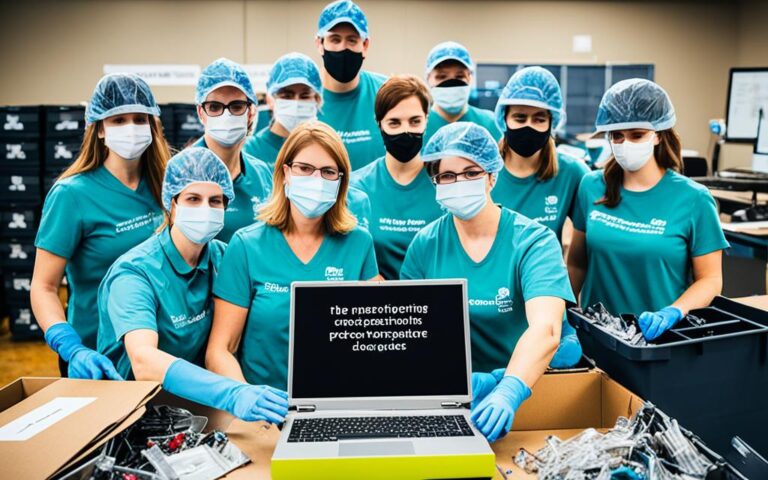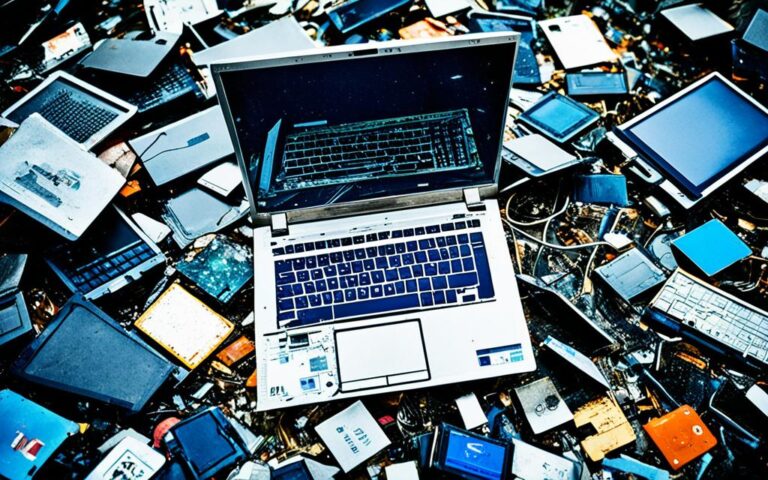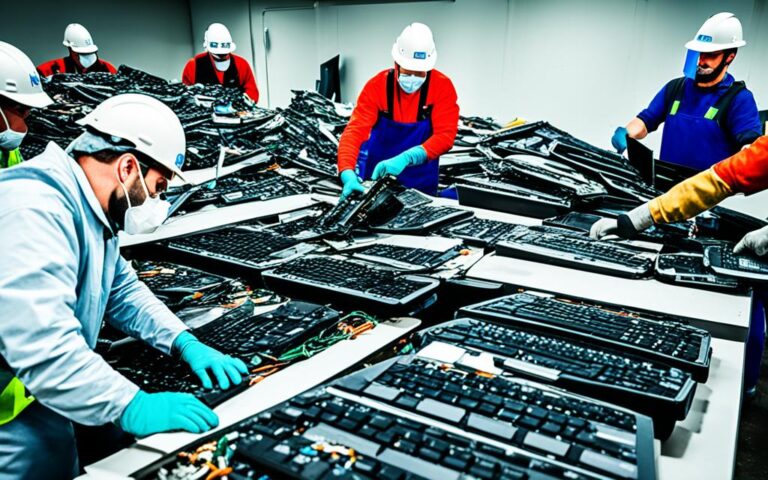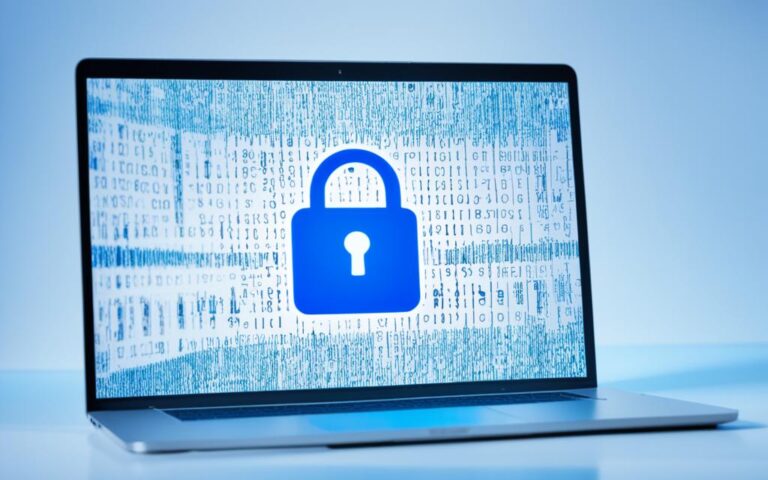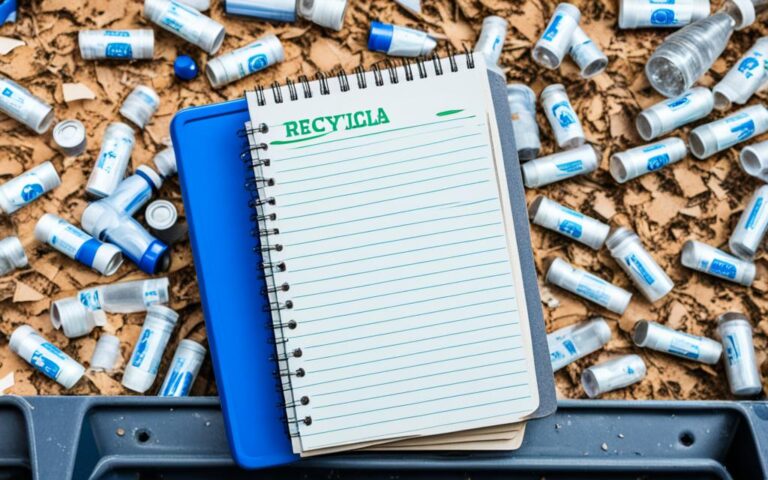The Impact of Laptop Recycling on Reducing Toxic Waste
In today’s digital age, laptops have become an essential part of our lives. However, the fast-paced technology industry has led to a significant increase in electronic waste, also known as e-waste. Improper disposal of e-waste can have detrimental effects on the environment and human health, with toxic substances seeping into our ecosystems.
That’s where laptop recycling comes in. By recycling laptops and other electronic devices, we can make a positive impact on reducing toxic waste and safeguarding the environment. According to the World Health Organization, e-waste is the fastest-growing solid waste stream globally, with only a small fraction being formally collected and recycled. This means that a significant amount of e-waste is ending up in landfills, posing a threat to our planet and our well-being.
Proper disposal of laptops through recycling ensures that valuable materials are recovered and reused, minimizing the need for new resources. It also prevents the release of toxic substances like lead and mercury into the environment, protecting both nature and human health.
As we strive for a more sustainable future, laptop recycling has become increasingly important. By participating in recycling initiatives and supporting responsible e-waste management, we can all contribute to the reduction of toxic waste and the preservation of our planet for future generations.
The Environmental Impact of E-Waste
E-waste, which includes discarded electronic devices like laptops, contains toxic substances such as lead and mercury. When these devices are improperly disposed of in landfills, they can release these substances into the soil, air, and water, causing environmental pollution.
This environmental impact of e-waste is significant and far-reaching. E-waste contributes to the rising volumes of waste, with between 20 and 50 million tons generated worldwide each year. This substantial amount of electronic waste exacerbates the already pressing issue of waste management and disposal, posing a threat to our environment.
The improper disposal of e-waste not only leads to the contamination of soil, air, and water but also contributes to the depletion of natural resources. Electronic devices contain various valuable materials, such as copper, silver, and aluminum, which can be recycled and reused. By discarding these devices without proper recycling, we squander these resources and perpetuate a cycle of resource extraction and waste generation.
“The improper disposal of e-waste not only leads to the contamination of soil, air, and water but also contributes to the depletion of natural resources.”
Furthermore, the lack of proper e-waste recycling exacerbates the environmental impact. Currently, only 15-20% of e-waste is being recycled, leaving the majority to end up in landfills or be incinerated. This ineffective recycling rate is a significant concern, as it means that the vast majority of e-waste is not being diverted from the waste stream. As a result, the environmental burden continues to grow, impacting ecosystems and human health.
To illustrate the environmental impact of e-waste in a quantifiable manner, consider the following table:
| Environmental Impact of E-Waste | Quantity |
|---|---|
| Electronic Waste Generated Annually | 20-50 million tons |
| E-Waste Recycled | 15-20% |
| E-Waste Improperly Disposed | 80-85% |
This table highlights the high volumes of e-waste generated annually, the low percentage of e-waste being recycled, and the significant amount ending up as improper waste disposal.
The environmental impact of e-waste calls for urgent action to address this growing problem. It is crucial to promote and prioritize proper e-waste recycling and disposal methods to mitigate the adverse effects on our environment. By increasing the recycling rate and implementing stricter regulations, we can minimize pollution, conserve resources, and move towards a more sustainable future.
The Importance of Laptop Recycling
Laptop recycling is paramount for multiple reasons. Firstly, it aids in preventing the release of toxic substances from e-waste into the environment, thereby reducing pollution and safeguarding human health. Secondly, recycling laptops and other electronic devices helps conserve valuable resources such as copper, silver, and aluminum by reusing them instead of resorting to new material extraction. This practice not only conserves energy but also prevents air and water pollution associated with extracting and processing raw materials. Lastly, laptop recycling lessens the need for additional landfill space, thereby minimizing the environmental impact of waste disposal.
| Benefits of Laptop Recycling | Explanation |
|---|---|
| Prevents Environmental Pollution | Laptop recycling reduces the release of toxic substances into the environment, which helps combat pollution and protects human health. |
| Conserves Valuable Resources | By reusing materials from recycled laptops, valuable resources such as copper, silver, and aluminum are conserved, reducing the need for new material extraction. |
| Reduces Landfill Space | Laptop recycling minimizes the demand for additional landfill space, mitigating the environmental impact associated with waste disposal. |
“Laptop recycling lessens the need for additional landfill space, minimizing the environmental impact of waste disposal.”
By recycling laptops, individuals, businesses, and governments can contribute to environmental protection and sustainability. Taking the initiative to recycle electronic devices not only reduces pollution but also conserves resources and minimizes the strain on landfills. The responsible and ethical disposal of laptops plays a crucial role in ensuring a greener future for our planet.
Sustainable Solutions for E-Waste
To combat the environmental impact of e-waste, recycling plays a crucial role. Proper e-waste recycling helps reduce the burden on landfills, minimizes the release of toxic substances, and allows for the recovery of valuable materials for reuse.
Additionally, refurbished electronics offer a sustainable solution to e-waste by extending the lifespan of devices and reducing the demand for new products. By choosing to recycle and adopt refurbished electronics, we can effectively mitigate the environmental consequences of our digital lifestyles.
“Proper e-waste recycling helps reduce the burden on landfills, minimizes the release of toxic substances, and allows for the recovery of valuable materials for reuse.”
Benefits of Recycling for E-Waste Management
Recycling e-waste has numerous benefits for the environment and society. Here are some key advantages:
- Reduces landfill space requirements
- Prevents the release of toxic substances into the environment
- Conserves valuable resources
- Reduces energy consumption and air pollution associated with mining and production
Advantages of Refurbished Electronics
Choosing refurbished electronics has several advantages:
- Extends the lifespan of devices, reducing electronic waste
- Reduces the demand for new electronic products
- Cost-effective alternative to purchasing new devices
- Supports the circular economy by promoting reuse
Sustainable Solutions for E-Waste Infographic
| Recycling | Refurbished Electronics |
|---|---|
| Reduces landfill waste | Extends the lifespan of devices |
| Prevents the release of toxic substances | Reduces the demand for new products |
| Recovers valuable materials for reuse | Cost-effective alternative to buying new |
Collaborative Efforts for a Sustainable Future
Tackling the e-waste problem requires collaboration between individuals, businesses, and governments. By working together, we can create a greener and more sustainable world.
Awareness and Regulation
Raising awareness about the environmental impact of e-waste is a crucial step towards a sustainable future. Educating individuals on the importance of responsible disposal and recycling can help drive positive change. Governments can play a significant role by implementing regulations that enforce proper e-waste management and recycling practices.
Supporting Recycling Initiatives
Recycling initiatives are essential for reducing e-waste and promoting environmental sustainability. By supporting organizations that facilitate e-waste recycling, we can ensure that electronic devices, including laptops, are disposed of and recycled responsibly. Investing in recycling infrastructure and programs can help create a more circular economy, minimizing waste and maximizing resource efficiency.
Promoting Responsible Consumption
Responsible consumption is key to reducing e-waste and preserving our environment. Choosing refurbished electronics, such as desktops, can contribute to the reduction of e-waste as they extend the lifespan of devices. By opting for refurbished products, we can minimize the demand for new electronics and conserve valuable resources.
| Benefits of Collaborative Efforts | Impact on Environmental Sustainability |
|---|---|
| Enhanced e-waste recycling infrastructure | Reduces the accumulation of hazardous materials |
| Increased awareness and education | Encourages responsible disposal practices |
| Effective implementation of regulations | Ensures compliance and proper e-waste management |
| Support for sustainable alternatives | Reduces the production of new electronics |
“The only way forward is to work collaboratively, combining our efforts to protect the environment and create a sustainable future for generations to come.” – Jane Green, Environmental Activist
Through collaborative efforts, we can effectively address the e-waste problem and strive towards a more sustainable future. By raising awareness, supporting recycling initiatives, and promoting responsible consumption, we can reduce the environmental impact of e-waste and protect our planet for future generations.
Conclusion
In conclusion, laptop recycling plays a vital role in reducing toxic waste and minimizing the environmental impact of e-waste. Proper disposal and recycling of laptops help prevent the release of harmful substances into the environment, conserve valuable resources, and reduce the need for landfill space. By choosing to recycle laptops, we can make a significant difference in protecting our environment for future generations.
Laptop recycling is not only important for reducing the environmental impact of e-waste but also for promoting a more sustainable future. Through collaborative efforts from individuals, businesses, and governments, we can work together to address the growing issue of e-waste. Raising awareness about the benefits of laptop recycling and supporting recycling initiatives are crucial steps towards achieving environmental sustainability.
By recycling laptops, we can contribute to the conservation of valuable resources like copper, silver, and aluminum. Reusing these materials reduces the need for new mining, which in turn conserves energy and prevents air and water pollution associated with extraction and processing. Additionally, laptop recycling helps in minimizing the release of toxic substances such as lead and mercury into the environment, protecting both human health and the planet.
Choosing to recycle laptops and supporting sustainable solutions not only reduces our individual environmental footprint but also sets an example for others to follow. Together, we can make a positive impact on the environment and create a greener, more sustainable world. Let’s take action today to recycle our laptops and contribute to a better future for all.
FAQ
How does laptop recycling contribute to reducing toxic waste?
Laptop recycling plays a vital role in reducing toxic waste by ensuring the proper disposal and recycling of electronic devices. This prevents the release of toxic substances such as lead and mercury into the environment, minimizing pollution and protecting human health.
Why is the environmental impact of e-waste significant?
E-waste, which includes discarded electronic devices like laptops, contributes to environmental pollution. Improper disposal of e-waste releases toxic substances into the soil, air, and water, causing environmental harm. With between 20 and 50 million tons of e-waste generated worldwide each year, proper recycling is crucial to minimize this environmental burden.
What are the benefits of laptop recycling?
Laptop recycling is essential for several reasons. Firstly, it prevents the release of toxic substances from e-waste into the environment, reducing pollution and protecting human health. Secondly, it conserves valuable resources like copper, silver, and aluminum by reusing them instead of mining new materials. Lastly, it reduces the need for additional landfill space, minimizing the environmental impact of waste disposal.
How can sustainable solutions help combat e-waste?
Sustainable solutions such as recycling and adopting refurbished electronics are effective ways to mitigate the environmental consequences of e-waste. Recycling reduces the burden on landfills, minimizes the release of toxic substances, and allows for the recovery of valuable materials for reuse. Refurbished electronics offer a sustainable solution by extending the lifespan of devices, reducing the demand for new products.
What collaborative efforts are needed to address e-waste?
Tackling the e-waste problem requires collaboration between individuals, businesses, and governments. Raising awareness about the environmental impact of e-waste, implementing regulations, and supporting recycling initiatives are crucial steps towards a more sustainable future. Additionally, promoting responsible consumption and supporting sustainable electronics like refurbished desktops can contribute to reducing e-waste.

